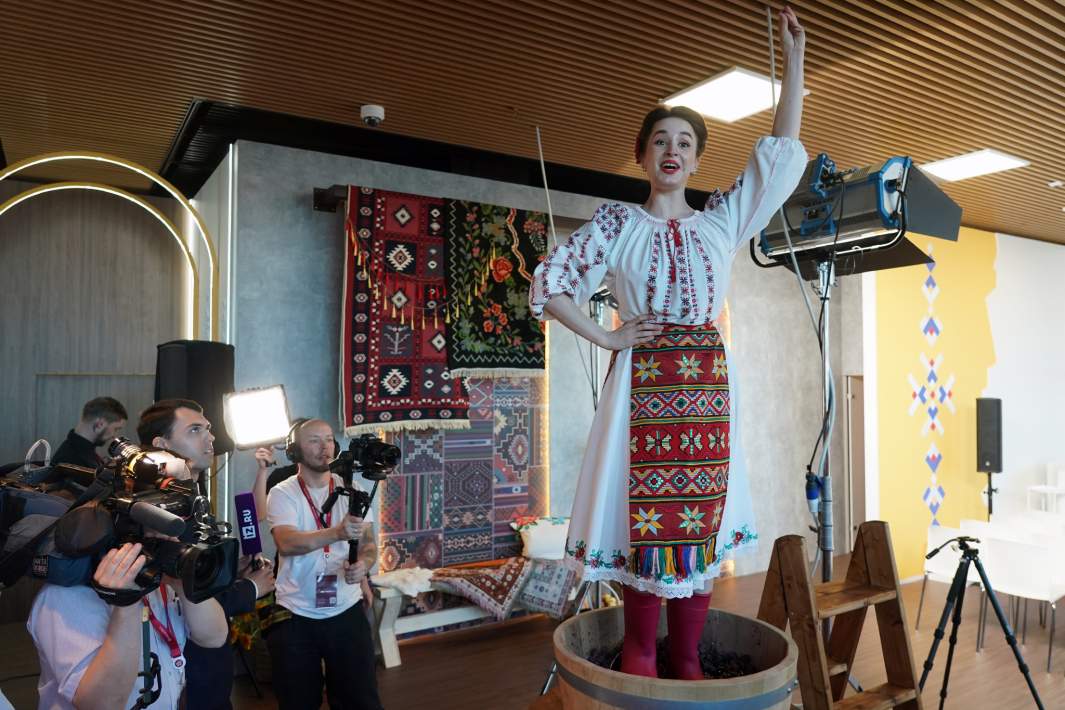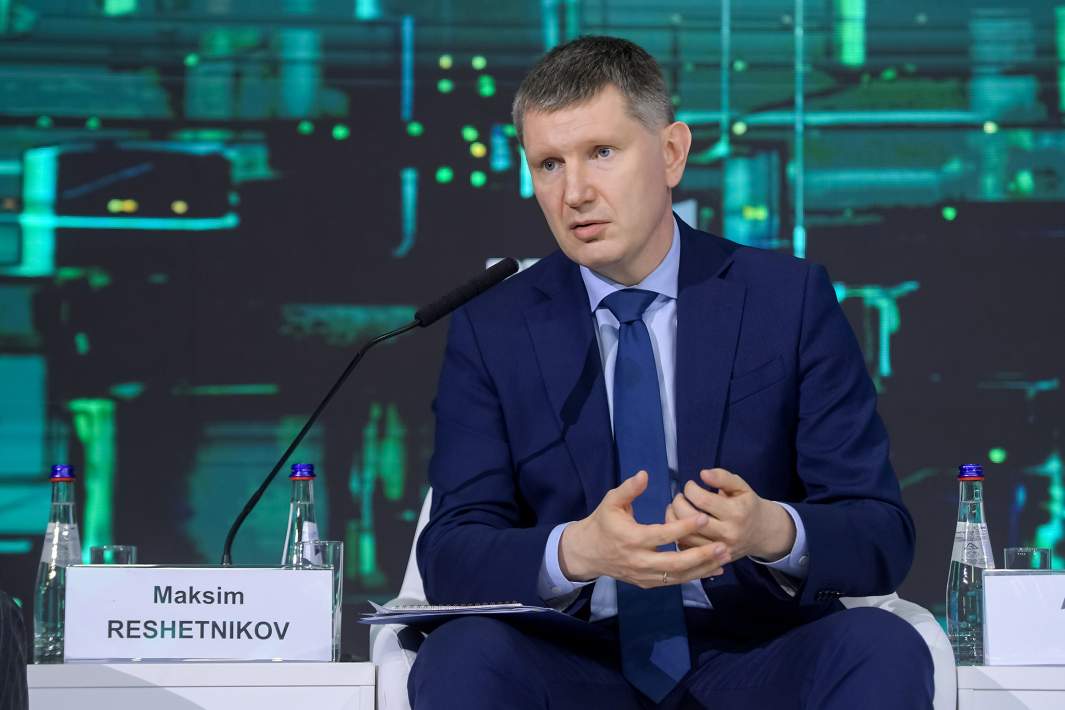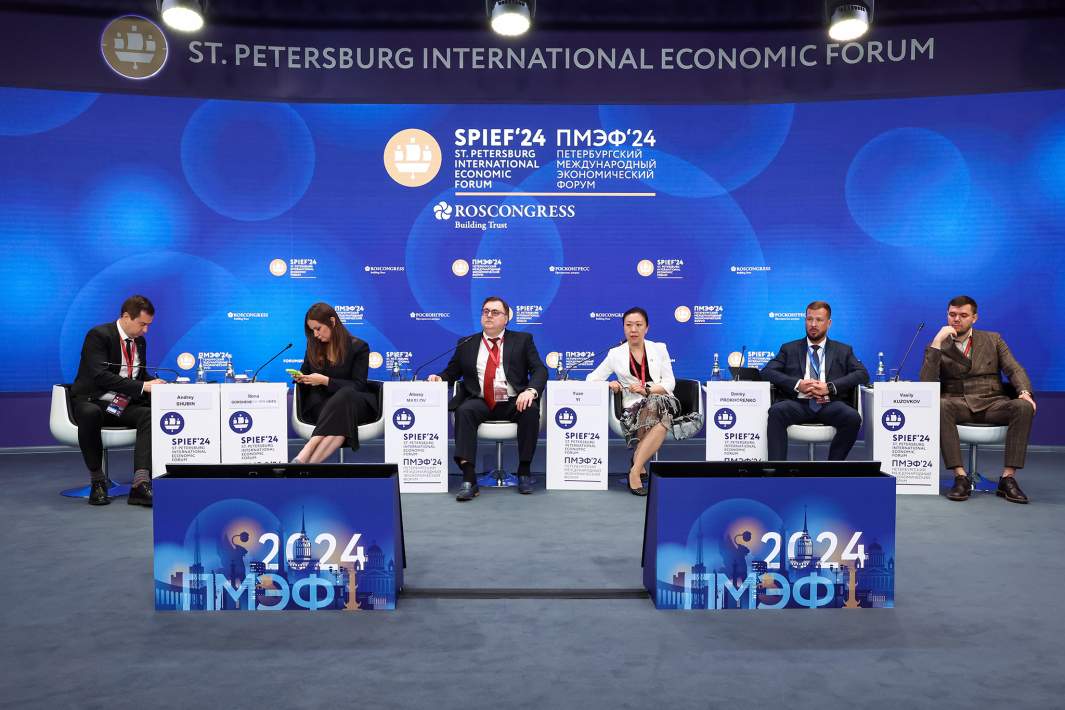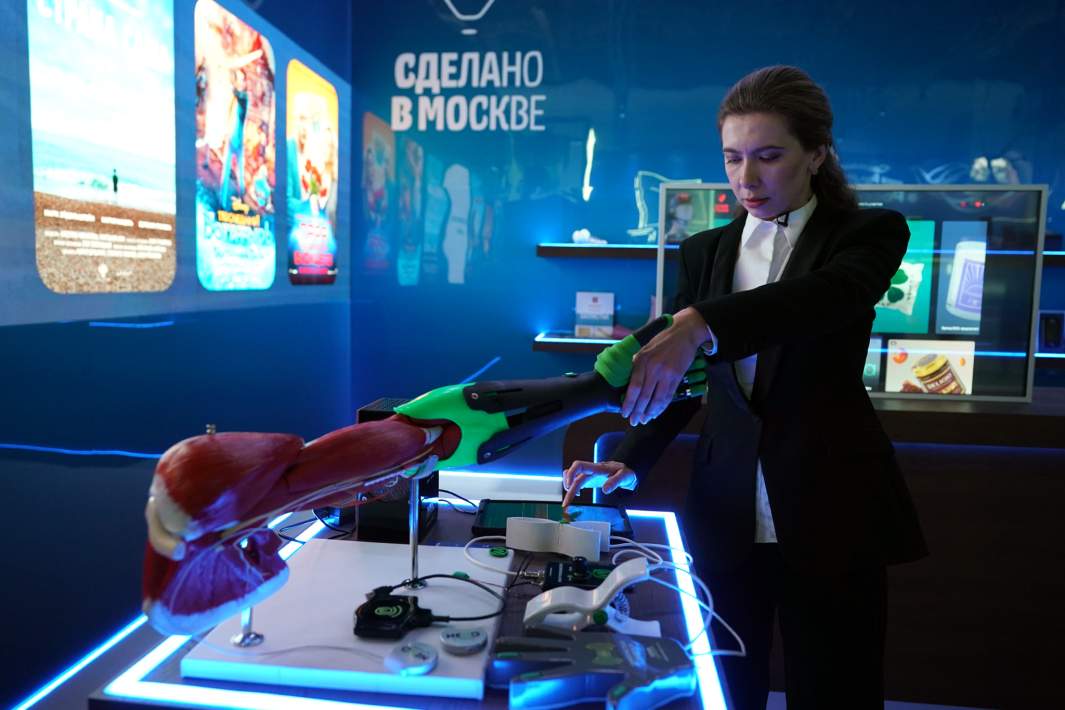
Sin preparativos ni ensayos: normalmente el día cero del SPIEF se designa como el día de inicio del programa de este año. Desde el principio, a los participantes les esperaba una intensa agenda de eventos: varios foros, un día de cooperación internacional (diálogo empresarial con países amigos) y la apertura de plataformas especializadas. También fue necesario encontrar tiempo para explorar los pabellones, hacer tratos, comparar los logros de las industrias automovilísticas rusa y china y probar el helado entregado por una maqueta de un tren de alta velocidad. En el informe de Izvestia se explica cómo empezó el foro económico en San Petersburgo.
Del barco al SPIEF
Incluso antes del inicio del foro, en los medios aparecían constantemente comparaciones con los años anteriores a la pandemia: dicen que han regresado a ellos en términos de alcance y número de participantes (más de 17 mil de 136 países). De hecho, tras la pausa de 2020, la recuperación no se produjo de forma inmediata, sobre todo porque hace dos años el SPIEF también sobrevivió a la prueba de las sanciones. Ahora, como demostró el día inicial (no cero en todos los sentidos), todo parece haber vuelto a la normalidad. Pero aún así algo ha cambiado en la atmósfera y el contenido del foro.
Por lo general, el primer día del SPIEF muchos participantes y oradores recién llegan a San Petersburgo; Pero no en este momento.
A pesar del buen tiempo veraniego, los participantes acudieron corriendo al lugar desde primera hora de la mañana. Por cierto, sobre el clima. Uno de mis colegas observó que San Petersburgo no ha estado a la altura de su título de ciudad lluviosa por sexto año consecutivo durante el período SPIEF. Lo más probable es que sea el quinto, ya que en 2020, por razones obvias, el foro no se celebró, y en 2017 se celebró a 8 grados centígrados, acompañado de fuertes vientos y aguaceros.
En el contexto de las gradas.
Los stands y pabellones de la SPIEF de este año también impresionaron por su número y variedad. Es difícil recordar un desfile de presentaciones brillantes e incluso informales como este año. Si en años anteriores el principal lugar de atracción para los amantes de los selfies era la pared de mosaicos de flores del stand de Uralchem, ahora la competencia para aquellos que quieren fotografiarse con un hermoso fondo ha aumentado considerablemente. Sólo algunos ejemplos: un enorme transformador en la región de Moscú, un no más pequeño caballito de madera en Avito, una abeja en Bashkortostán. Pero la mayor sensación la causó el dragón rojo (¿qué otra cosa podría ser?) en Chinatown, construido por Alfa Bank, que explica esta elección con un cartel en ruso-chino: “El mejor banco para hacer negocios con China”.
Mientras tanto, se ha desarrollado una competencia informal entre las industrias automovilísticas china y rusa. Desde la puerta, los invitados fueron recibidos por una galería de coches ejecutivos de la marca Khuntsy Rusia, que mostró el nuevo Lada, que pronto entrará en producción.
Otra cosa agradable este año es que nadie pasará hambre en el foro. El primer día, en el stand de Moscú , una maqueta de un tren de alta velocidad llevó helado a los visitantes, y en el stand de Rosselkhozbank, auténticas fresas esperaban a sus catadores. También puede probar queso, fruta y vino en el "Patio de Moldavia", especialmente organizado y que se abrió con el pisado de las uvas en una tina, y que todos recordamos de la película italiana "La fierecilla domada". Pero este antiguo rito-danza no fue realizado por Adriano Celentano, sino por una chica vestida con traje nacional. Ese día, en el acogedor patio, se habló mucho de lo importante que es para Moldavia ser amiga de Rusia, no sólo en el aspecto cultural, sino también en el ámbito comercial. El vino y todo lo relacionado con él (presentaciones de expertos, debates, catas, etc.) esperan a los visitantes de la plataforma temática VinoGrad, que se inaugura por tercera vez en el SPIEF.
El 5 de junio también se inauguró una nueva plataforma de debates, Roscongress Urban Hub, que reúne a los mayores desarrolladores de Rusia. A lo largo del foro, arquitectos, promotores y urbanistas debatirán sobre las ciudades del futuro y, como señalaron los organizadores, en un ambiente informal, sin ataduras.
Hacia una economía de salarios altos
Otra diferencia entre el SPIEF actual y los anteriores: si antes al foro acudían empresarios para hablar con las autoridades (razón por la cual el flujo principal de participantes no se produjo el día cero), ahora en realidad es una plataforma B2B. Los emprendedores se reúnen para comunicarse, intercambiar experiencias y encontrar nuevas soluciones.
Por tanto, no es de extrañar que en el programa del Foro PYME aparecieran sesiones totalmente aplicadas. Por ejemplo, "Gran cantidad de dinero para pequeñas empresas: trucos para atraer préstamos y capital". En la sesión plenaria del Foro de las PYME también se debatió cómo pueden recibir fondos los “niños”.
Según Mikhail Mamuta, jefe del servicio de protección de los derechos de los consumidores y garantía de la disponibilidad de servicios financieros del Banco Central, la cartera de préstamos a las PYME ya ha superado los 13 billones de rublos y su tasa de crecimiento es mayor que la de los préstamos a las empresas en general. Aunque los préstamos no son la principal vía de inversión para las pequeñas y medianas empresas. La mayor parte proviene de los ingresos. Sin embargo, con el desarrollo de mecanismos de acceso a los mercados de capitales, este canal está adquiriendo cada vez más importancia. Además, no estamos hablando sólo de bonos, sino también de OPI, que ahora tienen una gran demanda entre los inversores.
— Hay atracciones que no ascienden ni a mil millones o más, sino a 150 mil millones de rublos. Y también hay ejemplos de este tipo. Existe una gran demanda de salidas a bolsa de pequeñas y medianas empresas, y periódicamente hay un exceso de suscripción de emisiones. Hay cola para la salida a bolsa”, afirmó Mijaíl Mamuta.
La razón de esto fue revelada por el presidente de la organización pública panrusa de pequeñas y medianas empresas “Apoyo a Rusia”, Alexander Kalinin. Según él, las pequeñas empresas son muy eficaces. Así, con una inversión de 600 mil millones de rublos desde 2018, las pymes pagaron 1,5 billones.
Curiosamente, una encuesta realizada durante la sesión mostró que atraer inversiones no era lo más importante para los pequeños y medianos empresarios. El mayor problema es la escasez de personal. Cómo solucionarlo en condiciones de escasez de mano de obra y aumento de salarios, que ya no sirven como motivación para atraer personal, preguntó el moderador de la sesión al ministro de Economía, Maxim Reshetnikov.
Y sorprendió a los allí reunidos al aclarar la cuestión del encantador crecimiento de los salarios, que ahora se discute comúnmente. Según el titular del Ministerio de Economía, si en 2018 la participación de los salarios en el PIB era del 45%, ahora ronda el 40%. Y en los países desarrollados, el 50% o más. Es decir, señaló Reshetnikov, hay espacio para crecer para corresponder a la economía de salarios altos de la que habló el presidente. Según el jefe del departamento, una de las soluciones a la cuestión del personal es un enfoque más flexible en materia de remuneración, que ya funciona en la industria de defensa y tiene sentido utilizarlo en la producción civil.
La escasez de personal es el principal problema que preocupa a los empresarios, también en Novorossia y Donbass , confirmó el vicepresidente de Opora Rusia, Serguéi Lapenko. Según él, las PYME en los nuevos territorios se están desarrollando más activamente que la media nacional.
— Crecimiento — 7%. “Hoy en día hay interés de empresas de todo nuestro gran país, de otras regiones”, señaló, y agregó que es muy importante analizar qué medidas de apoyo se pueden brindar para que la gente regrese.
Marca con adaptación
En Rusia, la participación de las pequeñas y medianas empresas en el PIB es de poco más del 20%, y en China, por ejemplo, del 60% al 70%, se observó en la sesión plenaria. Y es el mercado del Estado vecino el que puede interesar a nuestros empresarios. La sesión "Interacción entre las PYME de Rusia y China" estuvo dedicada a dar consejos prácticos sobre cómo lograrlo correctamente.
Antes de explorar el mercado chino es necesario estudiar el país, destacó M.V., director del Instituto de Países Asiáticos y Africanos de la Universidad Estatal de Moscú. Lomonosov Alexey Maslov.
"Tenemos que cometer grandes errores en Rusia y no rompernos la cabeza yendo a China, tenemos que prepararnos para ello", dijo en sentido figurado el especialista.
Y es importante no “introducir estúpidamente productos en el mercado chino, sino adaptar la marca”. Así, el experto citó como ejemplo la experiencia de las cafeterías Starbucks, que promocionan el té en China, ya que esta bebida es conocida y querida en el país. Según Alexey Maslov, los productores de chocolate Alenka no lo hicieron tan bien. Esta marca, por cierto, es bastante conocida en China, pero se produce en el norte de este país, ya que nuestros empresarios no registraron una marca al ingresar al mercado. Los chinos rápidamente se aprovecharon de esto.
Como aconseja el experto, es necesario tratar el mercado chino como una inversión a largo plazo. Y si no puedes hacerlo solo, entonces debes hacerlo en asociaciones, utiliza los recursos del Centro Ruso de Exportación (REC). Por su parte, Dmitry Prokhorenko, director de desarrollo de la red exterior de REC, afirmó que la organización ha encontrado una herramienta para China: promocionar nuestros productos bajo la marca "Made in Russia". En su opinión, se trata de una gran herramienta general para las PYME que no pueden gastar mucho en publicidad.
Yuan Yi, socio principal de la oficina de Moscú del bufete de abogados DHH, destacó la necesidad de comprobar a los posibles socios. Existe un recurso público para esto y también puede involucrar a un abogado. A veces basta una visita a la oficina de una empresa para comprender que no realiza ninguna actividad. También hay una característica importante de los procedimientos judiciales en China, donde no existe arbitraje, que es un componente importante de la actividad empresarial en la resolución de disputas.
Intercambio vital
En el foro "Seguridad de los medicamentos en el espacio BRICS" se discutió la cooperación no sólo con China, sino también con otros países, principalmente Brasil e India. Como afirmó el jefe del Ministerio de Salud, Mijaíl Murashko, la comunicación y la cooperación con los Estados que tienen altas competencias en farmacología y regulación para defender su posición en las plataformas internacionales son muy prometedoras. Recordó que fue en los países miembros de la asociación donde se registraron los primeros medicamentos innovadores que permitieron resistir al COVID-19 . Como dijo Murashko, hay varios ámbitos en los que Rusia puede desarrollar la cooperación con los países BRICS: no sólo se trata de medicamentos contra las infecciones, sino también, por ejemplo, de la medicina nuclear, que recientemente ha sido repensada.
Por cierto, es esta última dirección la que tiene un buen potencial de exportación para Rusia. Y en términos de suministro al extranjero, todavía hay mucho margen de desarrollo en el segmento farmacéutico.
— En los últimos años, la industria farmacéutica rusa ha aprendido a responder a todos los desafíos y amenazas. El rumbo hacia la sustitución de importaciones ha permitido formar una base productiva seria. Las empresas nacionales producen tanto medicamentos genéricos como originales”, afirmó la viceministra de Industria y Comercio, Ekaterina Priezzheva.
Según sus palabras, los productos farmacéuticos de nuestro país se suministran a más de 150 países de todo el mundo. Pero el año pasado, por ejemplo, Rusia vendió 53 veces menos medicamentos a los países BRICS de los que les compró. Según la estrategia Pharma-2030, la Federación de Rusia se enfrenta a la tarea de multiplicar por 2,5 los volúmenes de exportación. Además, como dijo el subdirector del Ministerio de Industria y Comercio, nuestro país está dispuesto a desarrollar la cooperación y brindar medidas de apoyo en términos de localización del desarrollo y la producción hacia y desde los países BRICS.
En el marco de la jornada de cooperación internacional en formato de diálogo empresarial se celebraron debates sobre la cooperación con muchos países amigos: Kirguistán, Kazajstán, Sudáfrica, Brasil, India, Venezuela.
La jornada inicial fue agitada y larga, y también se jactó un poco de los logros de la economía nacional. Rusia, como se desprende del eslogan del SPIEF, busca su lugar en el nuevo mundo multipolar. En una de las sesiones, la representante china Yuan Yi recordó el proverbio popular de su país: el momento adecuado, el lugar adecuado, las personas adecuadas traen la suerte.




























